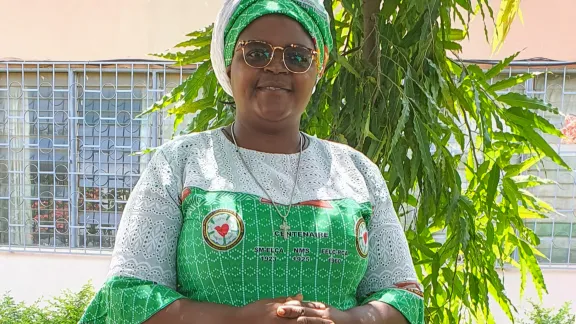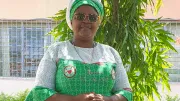
Old Testament scholar Rev. Delphine Fongeh Nsufor, Evangelical Lutheran Church in Cameroon. Photo: Private
PhD scholar and congregation leader reflects on new understanding about inclusion and empowering young people
The Lutheran World Federation (LWF) approved my scholarship application to pursue a PhD in Old Testament through the Hélène Ralivao Fund in 2022. This was immediately after my ordination in the Evangelical Lutheran Church in Cameroon (Église évangélique luthérienne au Cameroun -EELC).
Before my ordination, I served as the first permanent spiritual leader of the EELC Bafia congregation from 2021 until my departure to pursue the doctorate study program. Bafia is a fairly new congregation started in 2018, with young people making up the majority of its members.
Besides the weekly routine of a parish leader, I was responsible for training parishioners to assume responsibility especially for Sunday school, the youth movement (JEELC – Les Jeunes de l’EELC) and the Women for Christ (Femme Pour Christ). I also organized outreach programs and diaconal visits to prisons and hospitals. Having served as a Sunday school teacher and youth leader before, I saw my role as important not only in preparing the future leadership of EELC but also in empowering the young church members to actively take part in building the congregation, of which they are founding members.
As an LWF scholarship holder, I got the opportunity to take part in the online leadership training sessions for fellow scholars in theology. The course modules are very practical and relevant, and the facilitators also shared their own experiences about leadership in the Lutheran communion, which had a great impact on me.
Involving young people
The Intergenerational Justice and Gender Justice course particularly dealt with my day-to-day reality in an African-Cameroonian context where women and youth are struggling to contribute and participate in decision making in a predominantly male-led church and society. I recall one facilitator explaining that using the term “giving women a voice is a form of oppression because they already have voices.” This was backed by biblical reflection on the Canaanite Woman in Matthew 15:21-28 to encourage us to not keep quiet no matter the opposition, or lack of attention especially from people in leadership. We were encouraged to involve young people and allow them to share their know-how to ensure good succession processes and sustainability of the church. This is a prevalent challenge in our Christian communities, and more effort is needed to empower young people and advocate for their involvement.
I hope to use the skills learnt during the online sessions to encourage my parishioners to cultivate inclusive leadership where everyone is welcome to participate according to their God-given talents. Moreover, I hope to use this knowledge to encourage women to come out of their shells and confidently ‘sing out’ what they have so their voices can be heard.
I’ll remain focused on nurturing the next generation of leaders and creating a space where everyone’s voice can be heard.
Rev. Delphine Fongeh Nsufor, Evangelical Lutheran Church in Cameroon.
Servant leadership
The mentoring sessions offered during the leadership training helped me a lot, as I was getting very stressed and weary with trying to be a super leader of my congregation. I learnt that servant leadership is not synonymous with a one–person show, but it calls for deliberate efforts to include, trust, and equip others to handle positions of responsibility.
As I continue with my studies and ministry, I’ll remain focused on nurturing the next generation of leaders and creating a space where everyone’s voice can be heard.
Rev. Delphine Fongeh Nsufor is an ordained pastor of the Evangelical Lutheran Church in Cameroon. She earned her bachelor’s and master’s degree studies in theology at the Protestant University of Central Africa (PUCSA) in Yaoundé, followed by a six-month course on Lutheran emphasis at the Lutheran Institute of Theology in Meiganga, Cameroon. She is preparing to start her LWF-supported PhD program in Old Testament studies.
The LWF Scholarship program complements the students’ academic programs with online training on leadership. This space offers opportunities to explore the concept and practice of church leadership in an intercultural and inter-generational context and strengthen understanding of what it means to be leaders in the Lutheran communion. The training is designed to support participants’ individual growth in leadership and inspire them for life-long-learning. The goal is to increase awareness about the LWF, its vision, mission, values and strategic work.



